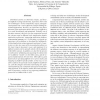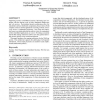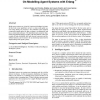119
click to vote
HOTOS
2003
IEEE
15 years 7 months ago
2003
IEEE
Trusted computing (e.g. TCPA and Microsoft’s NextGeneration Secure Computing Base) has been one of the most talked about and least understood technologies in the computing commu...
127
click to vote
EDOC
2003
IEEE
15 years 7 months ago
2003
IEEE
Distributed systems are inherently complex, and therefore difficult to design and develop. Experience shows that new technologies—such as components, aspects, and application f...
131
click to vote
DISCEX
2003
IEEE
15 years 7 months ago
2003
IEEE
Distributed systems require strategies to detect and recover from failures. Many protocols for distributed systems employ a strategy based on leases, which grant a leaseholder acc...
103
click to vote
FIDJI
2004
Springer
15 years 7 months ago
2004
Springer
Abstract. When dealing with distributed systems, one of the most important problems that has to be addressed is concurrency. Distributed systems are inherently concurrent, distribu...
140
Voted
EUROPAR
2004
Springer
15 years 7 months ago
2004
Springer
The interesting properties of P2P systems (high availability despite peer volatility, support for heterogeneous architectures, high scalability, etc.) make them attractive for dist...
110
click to vote
CIKM
2004
Springer
15 years 7 months ago
2004
Springer
Endeca’s approach to processing search queries in a distributed computing environment is predicated on concerns of correctness, scalability, and flexibility in deployment. Using...
129
Voted
ATAL
2004
Springer
15 years 7 months ago
2004
Springer
Product Distribution (PD) theory was recently developed as a framework for analyzing and optimizing distributed systems. In this paper we demonstrate its use for adaptive distribu...
116
click to vote
ADVIS
2004
Springer
15 years 7 months ago
2004
Springer
This paper introduces a new programming model for distributed systems, distributed composite objects (DCO), to meet efficient implementation, transparency, and performance demands ...
104
click to vote
SWS
2004
ACM
15 years 7 months ago
2004
ACM
Supporting security in distributed systems is becoming more important with the ongoing work in grids, distributed middlewares and web services. Decentralised security architecture...
115
click to vote
ERLANG
2004
ACM
15 years 7 months ago
2004
ACM
Multi-agent systems are a kind of concurrent distributed systems. In this work, some guidelines on how to create multi-agent systems using Erlang are presented. The modelled syste...




